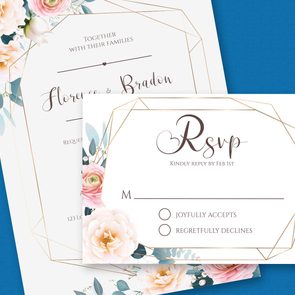How to Say No Politely and Firmly in Any Situation

Protecting your time, energy and sanity is important. Here's how to say no and safeguard those boundaries.
I’m notoriously bad at saying no. I’m a people pleaser who feels like if I disappoint anyone, ever, then I’ll die alone. (I’m also dramatic.) Which is how I ended up teaching a fitness class the day after I had major knee surgery. I hobbled into the studio on crutches, propped myself on a stool and yelled directions at a group of sweaty people—all while hoping my pain meds didn’t wear off. If only I’d known how to say no.
Saying no isn’t just an etiquette skill, it’s a life necessity if you want to be happy and mentally healthy, says Gretchen Rubin, a happiness expert and the author of The Happiness Project and Better Than Before.
“Living someone else’s version of your life because you can’t say no is a tragedy,” she says. The solution? Setting boundaries. “Ultimately, saying no is making a boundary that protects both you and the other person,” she says. After all, saying yes to one thing means saying no to everything else. It tends to be a “polite” mistake. But by drawing boundaries, you can focus your time, energy and “yeses” on the things that are important to you.
Knowing what to say is one thing; actually learning how to say no is a lot tougher. Here’s how to do it.
Get Reader’s Digest’s Read Up newsletter for etiquette, humor, cleaning, travel, tech and fun facts all week long.
Why is it hard to say no?
“We all want to feel loved, valued and needed, and saying yes fills a lot of those basic human needs,” says Jeff Temple, PhD, a licensed psychologist and professor at the University of Texas Medical Branch. “We also all fear being rejected, left out or disappointing others.”
Your relationship with the person asking plays a big part in how compelled you may feel to say yes, he adds. Telling your mother no, for instance, probably feels a lot different than following gym etiquette and telling a stranger, “No, I’m not done with the weights.”
But perhaps the biggest reason it’s so tough to say no is because many of us simply weren’t taught how to do it, says Valerie Sokolosky, an etiquette expert, executive coach and author of eight etiquette books. “People often have trouble finding the right words to say no without sounding rude or mean,” she says. “Just like other types of etiquette, it’s a skill that gets better, and easier, with practice.”
When should you say no?
Knowing when to say no starts a long time before the question is even asked, Rubin says. “Take some time to list your values, then use those to make goals and define your priorities,” she says. “Once you know those things, it will be easier to draw boundaries to make sure you’re staying true to yourself.”
These situations will be different for each person, but a common problem Sokolosky hears often is work-life balance. For instance, if your priority is figuring out how to ask for a raise or getting a promotion within the year, then you may need to say no to certain family or friend obligations. But if your top priority is your family, then you likely have to learn to say no to your boss or colleagues.
Defining boundaries with family and loved ones can be tricky as well. Many people grew up with the idea that you must always be there for family. However, you can redefine what being there means for you, and sometimes that may mean saying no, Temple says. For instance, if you want to go to the family barbecue this weekend, you may have to turn down your friend’s offer to hang out the other nights of the week.
Different ways to say no
“Technically, ‘no’ is a whole sentence, and you don’t necessarily owe anyone an explanation,” says Temple. “But that can come across as abrupt, aggressive or cold. If you want to preserve the relationship or simply convey kindness, find a softer way to say it.” Whether you’re addressing it in person or following email etiquette or texting rules, here are some scripts for politely—but firmly—saying no.
- I really appreciate the offer, but I’m going to have to pass this time.
- Thank you for thinking of me, but I won’t be able to make it tomorrow.
- I’d love to come, but unfortunately I have a prior commitment that day.
- I’m so honored that you asked me, but I’m maxed out at the moment.
- It sounds lovely, but I won’t be able to make it. Maybe next time!
- You are so thoughtful to invite me; I’d love to meet up with you another day.
- I’m grateful for the opportunity, but I have to pass.
- I wish I could help, but I have a prior engagement.
- I’m sorry, but I have to respectfully decline.
- I’m flattered, but I have to say no this time.
- I really appreciate your offer, but I’m going to have to decline.
- It’s not you, it’s me—it’s been an exhausting week, and I need some quiet time.
- Thanks for reaching out, that means a lot to me. Unfortunately I won’t be able to this time, but let’s stay in touch.
- I’m sorry, but I’m not available for that.
- I’m afraid I can’t make it work, but I appreciate the thought.
- Thanks, but no.
Tips for saying no
Feeling a little more confident now? Our experts shared some tips to help you define your boundaries and stick to them—without feeling like a jerk. Here’s what you should know about saying no.
Do it in a timely manner
The longer you make people wait, the harder it will be to say no and the worse they will take it because you’re leaving them in limbo, Sokolosky says.
Buy a little more time
If someone puts you on the spot with a request, don’t feel like you have to give them an immediate answer. Sokolosky says it’s fine to simply say, “Let me think about that, and I’ll get back to you within 24 hours!”
Get to the point
One or two sentences is plenty to get your point across. Avoid giving lengthy excuses or arguing about your reasoning, Rubin says. “Your boundaries are not a debate.”
Be positive
Make a compliment sandwich, where you couch the negative between two positives, Temple says. For instance, “I’d love to come, but I’m already booked out that night. I’m so glad you reached out though, and I’m sure the event will be a huge success!”
Don’t say things you don’t mean
If a colleague invites you to coffee and you don’t want to hang out with them ever, don’t say, “Maybe another time!” Instead, Sokolosky suggests something like, “I really appreciate the offer, but I try to keep my work and personal life separate.”
Don’t be wishy-washy
Sounding unsure (saying things like “maybe I could make it work”) just gets people’s hopes up and gives them a reason to argue with you. If you’re sure it’s a no, then don’t beat around the bush, Rubin says.
Offer a little honesty
If you’re talking with a loved one, it’s okay to be vulnerable when explaining why you’re saying no—it can even strengthen your relationship over time, Temple says. It’s not required, but saying something that helps them understand you better reduces the risk of them taking it personally. Here’s an example: “Your event sounds awesome, but I’m really struggling with some depression right now, and big events are too much. I’d love to hang out just the two of us after and hear all about it!”
Be grateful
Even if you’re not technically thankful that your boss is asking you to work over the weekend, a little gratitude goes a long way when saying no, Sokolosky says. “Thank you so much for the opportunity, but I already have plans this weekend and won’t be able to help out this time.”
Pay attention to your non-verbal communication
Remember that your tone of voice, eye contact, method of communication and body language are as important as the words you choose, Sokolosky says.
Just start
Perhaps the best tip that all our experts agree on, however, is to just start saying no. It won’t be easy, especially at first, but the more you practice holding your boundaries, the better you’ll get at it. And don’t forget: Saying no isn’t rude, it’s saving your time, money and energy for things you really want to do and things that align with your values and goals—you know, like recovering from knee surgery!
About the experts
- Gretchen Rubin is the New York Times bestselling author of The Happiness Project. She is an expert in happiness and shares her wisdom through her blog and public speaking.
- Jeff Temple, PhD, is a licensed psychologist, professor and the John Sealy Distinguished Chair in Community Health at the University of Texas Medical Branch. He’s the director of the Center for Violence Prevention and has more than 230 scholarly publications in a variety of high-impact journals, including JAMA.
- Valerie Sokolosky is an etiquette expert, executive coach and author of eight etiquette books, including Do It Right! a comprehensive etiquette guide. She is one of only 20 “master brand strategists” worldwide and has served on executive boards, including the prestigious Leadership America.





